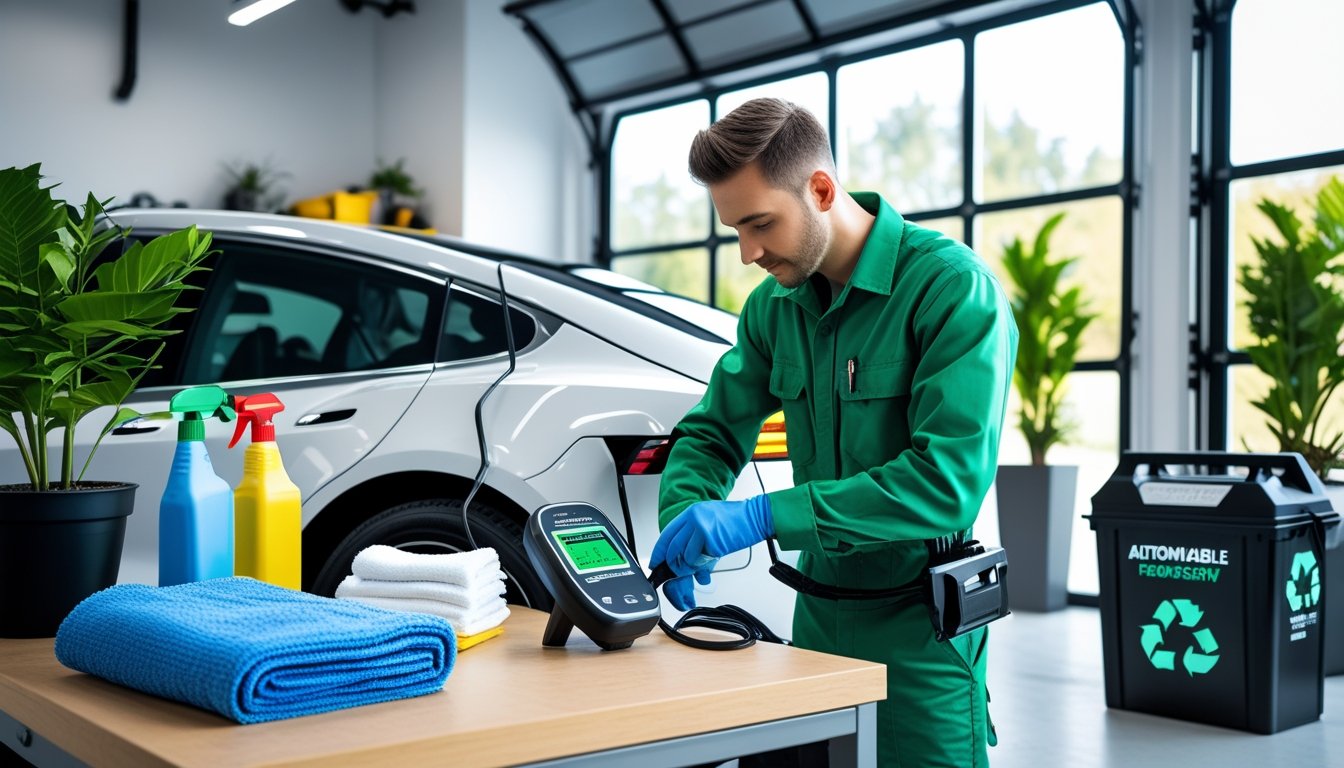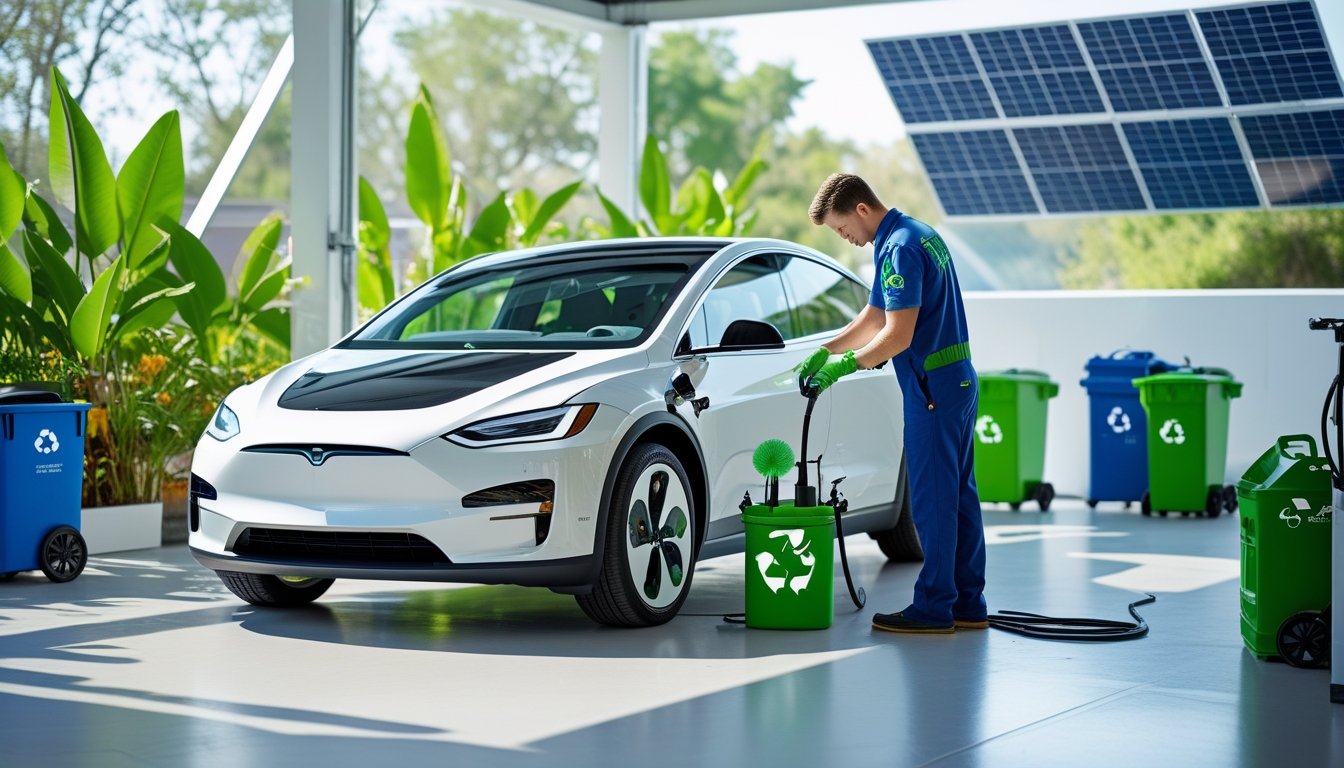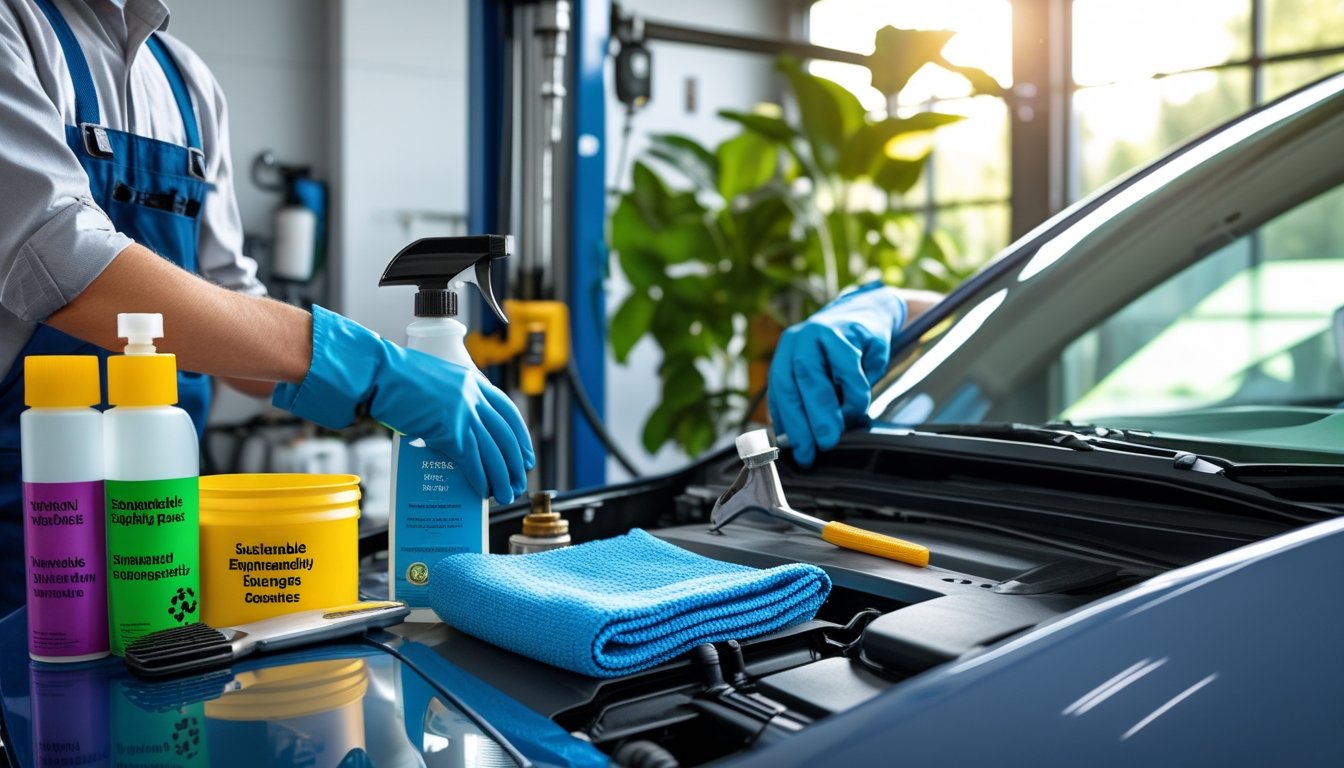Late updated: 27 May 2025 12:05
Written by: Sarah Hollister
Eco-Friendly Tips For Sustainable Vehicle Maintenance: Simple Strategies for a Greener Drive
Embracing eco-friendly vehicle maintenance isn't just about protecting our environment; it often leads to cost savings and improved vehicle performance. With urban pollution levels at all-time highs, our commitment to sustainable car care practices has never been more vital. Exploring eco-friendly vehicle maintenance can lead to a healthier planet and a longer-lasting vehicle.

Vehicles are essential for everyday life, yet they have a significant environmental impact. By choosing the right maintenance strategies, we can reduce this impact dramatically. Utilising biodegradable cleaning products, maintaining optimal tyre pressure and recycling engine fluids are simple steps that yield substantial results.
Adapting our driving and maintenance habits contributes to global sustainability efforts while supporting personal values of responsibility and stewardship. By innovating our approach, from reducing idling times to exploring alternative energy sources, we are not only protecting our driving investments but also paving the way for a greener future.
Key Takeaways
- Eco-friendly car care reduces environmental impact and costs.
- Simple maintenance strategies significantly benefit vehicle performance.
- Adapting habits supports global sustainability and future innovation.
Core Eco-Friendly Practices for Sustainable Vehicle Maintenance
Incorporating eco-friendly vehicle maintenance practices significantly reduces our environmental footprint. Key strategies include conducting regular maintenance, choosing sustainable products, recycling materials, and minimising energy consumption.
Regular Maintenance to Reduce Environmental Impact
Regular maintenance plays a crucial role in reducing our vehicle's environmental impact. Routine oil changes and timely engine tuning help the engine operate efficiently, thereby reducing emissions. Proper tyre maintenance, including regular inflation checks, not only ensures better fuel efficiency but also extends tyre lifespan, reducing waste.
We must also focus on filter replacement, such as air and fuel filters, to maintain optimal performance, which helps in burning fuel more cleanly. By adhering to these maintenance schedules, we contribute significantly to eco-friendly driving.
Choosing Energy-Efficient and Sustainable Car Products
Selecting the right car products is essential for sustainable maintenance. Opting for biodegradable cleaners, rather than chemical-heavy products, ensures that harmful substances aren't released during washing.
When it comes to oils and lubricants, choosing recycled or biodegradable options lessens environmental impact. Considering sustainable tyre options, like those made from recycled materials, ensures efficient performance with less ecological damage. These mindful choices contribute to an energy-efficient, eco-friendly driving experience.
Responsible Recycling and Reuse of Vehicle Materials
Recycling is a key facet of sustainable vehicle upkeep. When replacing batteries, turn in the old ones for recycling to prevent hazardous material from entering landfills. Similarly, recycling oil by taking it to designated collection points minimises pollution.
We should also recycle metal parts and plastics from vehicles at end-of-life stages. This reuse reduces the need for additional raw materials, conserving resources and energy that would otherwise go into producing new components. Thus, responsible recycling and reuse practices are crucial for lowering our ecological footprint.
Minimising Energy Consumption During Upkeep
Reducing energy consumption is a vital aspect of eco-friendly vehicle maintenance. Performing tasks such as routine checks at home instead of driving to a service centre can save energy. Moreover, ensuring the vehicle’s engine and electrical systems are in good condition boosts efficiency, lowering energy demands.
It’s also important to use energy-efficient tools and techniques when servicing our cars. Implementing solar-powered garage lighting, for example, further reduces our energy consumption. By focusing on energy efficiency during upkeep, we can substantially lessen the environmental impact of our vehicles.
Innovative Green Solutions for the Future of Vehicle Maintenance

Our focus is on how incorporating renewable technology and moving towards electric vehicles can drastically reduce our environmental footprint. We also explore ways to improve vehicle insulation, offering significant benefits in sustainability.
Integrating Renewable Energy and Sustainable Technologies
The use of renewable energy sources in vehicle maintenance is a promising area of innovation. We can look at installing solar panels on garages or service stations to power equipment.
Wind energy could also serve remote locations where traditional grid power might be limited.
Utilising sustainable car technologies means embracing biodegradable fluids and eco-friendly cleaning products. These not only reduce harm to the environment but also cut down on waste product accumulation.
Furthermore, by using battery storage systems, we can harness and retain energy from renewable sources for various maintenance tasks, making our operations more resource-efficient.
Transitioning to Electric Vehicles and Reducing Fossil Fuels
Transitioning towards electric vehicles (EVs) is crucial in cutting down dependence on fossil fuels. As more of us opt for EVs, a significant reduction in emissions is achievable.
A focus on EV charging infrastructure is essential. By expanding charging networks, we can alleviate range anxiety and encourage wider adoption.
Training mechanics in EV technology ensures effective maintenance and troubleshooting, making electric vehicle ownership more appealing and reliable.
Moreover, policies encouraging EV incentives can lead to a swift transition, encouraging manufacturers to put forth improved and more affordable options for consumers.
Enhancing Insulation and Reducing the Environmental Footprint
Improving vehicle insulation offers a dual benefit. Enhanced insulation keeps vehicles more comfortable in varying climates, reducing the need for air conditioning and thereby conserving energy.
Materials with superior thermal properties can replace outdated insulation, contributing to energy savings.
In tandem, we should focus on recycling used car parts efficiently. Proper recycling mitigates waste, aiding in lowering the environmental footprint of our vehicles.
Finally, ongoing innovations in lightweight materials contribute not only to reduced energy consumption but also extend the lifespan of cars, ensuring a sustainable future in vehicle maintenance.
Frequently Asked Questions

Sustainable vehicle maintenance helps reduce environmental impact while improving performance. Focusing on eco-friendly products, regular upkeep, and efficient driving habits can contribute to a cleaner planet. Let us delve into some commonly asked questions.
What are the best practices for maintaining a vehicle in an eco-conscious manner?
To maintain your vehicle in an eco-friendly way, use sustainable cleaning products and regularly check tyre pressures. This not only helps the environment but also increases fuel efficiency. Choosing biodegradable oils and maintaining regular servicing is also vital to extend the vehicle’s lifespan and minimise emissions.
How can regular vehicle maintenance contribute to environmental sustainability?
Consistent vehicle maintenance enhances engine performance and reduces harmful emissions. Keeping components like air filters clean can increase fuel efficiency, thus lowering your carbon footprint. By extending the life of your vehicle through proper maintenance, we reduce waste and the environmental cost of manufacturing new vehicles.
Which automotive fluids are most environmentally friendly for routine vehicle upkeep?
Biodegradable oils and non-toxic antifreeze are among the most environmentally friendly choices for your vehicle. These fluids break down more rapidly, reducing environmental contamination. Always choose products that are labelled as environmentally safe to minimise the impact on natural ecosystems.
What steps can individuals take to ensure their vehicle operates with maximum fuel efficiency?
Ensure regular engine tune-ups and maintain the correct tyre pressure to improve fuel efficiency. Avoid carrying unnecessary weight and adopt smooth driving habits like gentle acceleration and braking. Reducing idling time also conserves fuel and benefits the environment.
Can you suggest any eco-friendly products or tools for vehicle maintenance?
Eco-friendly cleaning agents, microfibre cloths, and waterless car wash solutions are crucial for sustainable car care. Additionally, consider using solar-powered battery chargers and LED lighting for repairs, which use less energy and have minimal environmental impact.
What are the benefits of using biodegradable materials in vehicle servicing?
Using biodegradable materials prevents harmful substances from contaminating soil and water. These products decompose more swiftly without leaving residual pollutants, ensuring a healthier ecosystem. Biodegradable materials also contribute to safer working environments in auto repair shops, reducing exposure to toxins.
